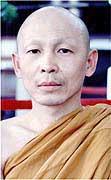GUEST
COLUMN / HUNGER STRIKE
Hunger
strikers make merit
Poor protesters who refuse food to make their point
about their plight also purify their spirit
Paisal Visalo, Bangkok
Post, Aug 13, 2000
Hired mobsters may jump at every
opportunity to unleash turmoil-blaring their noises, blocking streets,
hurling stones at their opponents. But will they let themselves be beaten
up by the police?Those "greedy" villagers may be willing to
march through heat and rain, issuing threats to descend on Government
House. But will they risk their own health starving for an indefinite
period? Even a week would have been too long.
 |
|
Paisal Visalo
|
Those who stage a hunger strike out of self-interest will soon have to
give up. No amount of money is worth putting one's life in jeopardy.
The attempt by villagers-under the umbrella of the Assembly of the
Poor-to enter Government House last month, despite the perils of a violent
crackdown, should be more than enough proof that they are not hirelings.
These people travelled to Bangkok after years of suffering. Clearly, the
drive of poverty is far more painful than the bruises and wounds wrought
by police batons.
Today the accusation of hirelings may start to fade away. But not the
stigma of greediness, charged by both the government and a large number of
Bangkokians.
Accordingly, the villagers had no other ways to counter those
accusations than to resort to fasting. Their hunger strike was not only to
prove their sincerity, but also to remind themselves they are on the right
path.
FASTING FOR PURITY
Hunger striking is a form of peaceful
struggle. But the ultimate goal is not only to push for political or
social changes, but also to purify the minds of the doers. Thus this kind
of strike is inseparable from self-purification. After all, it has long
been accepted in medical fields that occasional fasting helps cleanse the
body of toxins.
Spiritually, going on fasting also helps calm one's mind and get rid of
fanciful thoughts (as the body functions more slowly). Desires like sexual
lust and greed will dissipate leading to a feeling of lightness. A number
of people practising dhamma have adopted fasting for a couple of days as
part of their routines.
Likewise, many non-violent protesters choose fasting or hunger striking
as a means to protest. By subjecting themselves to suffering deliberately,
they hope to lessen the anger, hatred or selfishness that could occur
during the confrontation.
At the same time, they take the opportunity to re-examine their
action-whether they do it for the public interest or personal gain, to
maintain righteousness or to serve their personal ambition. Fasting helps
people see themselves clearly because during that time, desire loosens its
grip on the spirit. The calm and conscious mind will reflect who we truly
are.
Non-violent methods are powerful only when they are based on dhamma.
For this reason, practitioners of non-violence must review themselves
constantly and steer their course of action along the dhamma way if they
are to achieve their goals.
This is one of the reasons why members of the Assembly of the Poor
decided to stage a hunger strike. Some said they did so because they would
like to practise dhamma. In other words, these protesters wish to conduct
a self-analysis to ensure that it was not greed that sent them to camp out
in front of Government House. Some said they would like to extend the
merit to the government. Compassion emerges when the mind is freed from
hatred. Fasting, which reduces the extreme emotion, facilitates the
process of transferring merit.
The hunger strike is a means for the villagers to prove to themselves
and the public whether they are protesting for themselves or for countless
other people who are suffering from unfair development. It is a test
because only people with dhamma can stay strong with no sustenance.
Selfish people would lack the will to go on with the painful method.
And it is only when the minds of the protesters are focused on dhamma
that the hunger strike is in line with the Buddhist way, even if it could
result in death. Lord Buddha himself once said: Virtuous people should
abandon wealth to preserve organs, abandon organs to preserve life and
abandon wealth, organs and life in recognition of dhamma.
At the end of the day, the hunger strike is but a way for members of
the Assembly of the Poor to tell Thai society that the misery they are
experiencing is much worse than the pain of hunger. Also, the justice they
are asking for is so valuable that they are ready to sacrifice their lives
for it.
LOOK WHO'S GREEDY NOW
Today, the Assembly of the Poor has
proven to Bangkok people that they are not a greedy lot with insatiable
demands. Now, it is the city dwellers' turn to prove that they are not
that greedy either. To accuse the poor of having an insatiable demand
while they live comfortably would be blatantly unfair. However, a few
well-to-do middle class people continue to demand that the rural folks
give up their sources of livelihood (forests and rivers) for the sake of
cheap electricity and tapwater. The villagers now protesting in front of
Government House have long seen themselves plunging deeper into the pit of
poverty, as people like us become richer. Shall we continue to turn a
blind eye to their plight, telling them to be patient forever?If we
maintain our indifference to their suffering-then we should at least tell
the government who is in fact greedier.
Paisal Visalo is the abbot of the Sukhato
Forest Monastery in Chaiyaphum province. He is also a writer and social
thinker whose views are widely respected.

